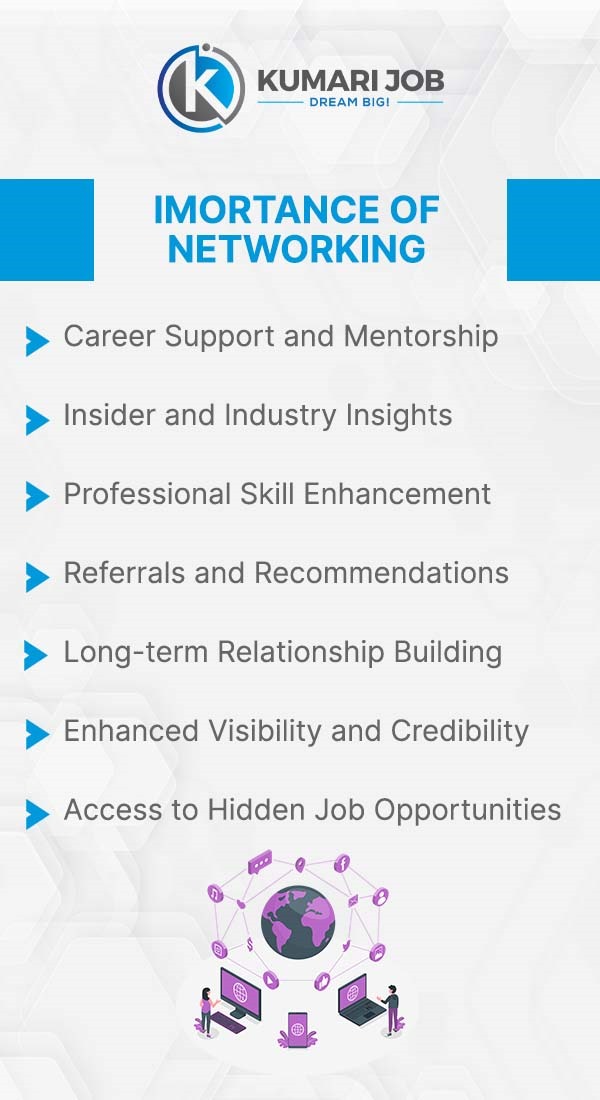
Introduction
Networking is a crucial aspect of job search, providing opportunities for career advancement and professional growth. It involves building and nurturing relationships within one's professional circle, including former colleagues, classmates, mentors, industry experts, friends, and family. These connections can offer insights into job openings, provide referrals, and advocate for one's skills and qualifications, making networking a vital tool for job seekers.
Networking is a strategic approach to job searching that offers numerous benefits. It provides access to hidden job opportunities, often unadvertised and filled through word-of-mouth recommendations or internal referrals. It also allows job seekers to gather valuable information about companies, industries, and career paths, which can help tailor their job search strategy and prepare for interviews. Networking also enhances visibility and credibility within the industry, as participating in events, professional associations, and online communities can establish one as a knowledgeable and reputable individual. This can lead to collaboration, speaking engagements, and job offers from companies seeking top talent.
Types of Networking: Online vs. Offline
1. Exploring Online Networking Platforms
Online networking, a strategy involving digital platforms like LinkedIn, professional forums, and social media, allows professionals to connect with recruiters and employers worldwide. It offers a broad reach, easy communication, and access to industry-specific groups. To maximise its benefits, optimize your LinkedIn profile, engage with connections through content sharing, participate in discussions, and use online networking events.
2. Leveraging In-person Networking Events
In-person networking events, such as conferences, seminars, workshops, and job fairs, allow professionals to exchange ideas, build relationships, and explore collaboration opportunities. These events facilitate personal interactions, deepen relationships, and provide opportunities for face-to-face communication. Strategies include preparing an elevator pitch, actively listening, exchanging business cards, following up with new contacts, and participating in post-events, and you’ll find that more career opportunities will open up.
In this blog
Importance of Networking
Learn how to network like a pro and you’ll find that more career opportunities will open for you as you build more connections.
1. You will find more opportunities through networking
The most obvious advantage networking can have in your search for a new job is that it can alert you to opportunities. Spread the word across your network of friends, past colleagues, family, and acquaintances when you’re in the job market. It’s a great way to find out about leads or opportunities you would otherwise not have known about. These people in your preexisting network can offer insights, connections, opportunities, career advice, LinkedIn tips, and more. Many of the best jobs come about through a referral.
An adage that human resource managers have is that many of the best job opportunities are never advertised, and thus you may never find out about them. However, if you learn how to network effectively, then you can get the inside scoop on job opportunities that never make it to career websites or newspapers.
2. Career networks offer great references
One of the most surefire ways for a job seeker to get hired is to have a stellar reference. If someone in your professional network can vouch for you, that’s even better. A personal testimonial from a friend or colleague can go a long way toward pushing you over the edge in a competitive job market. When you have a diverse career network filled with professionals, you have a list of references that are bound to impress any hiring manager.
3. Personal referrals are powerful first impressions
When it comes to finding out about an employment candidate, most hiring managers prefer referrals over cold leads. A cold lead is anyone who sends in a resume without someone to refer them. Most people indeed start as cold leads, but that does not diminish the fact that the referrals that come as a result of career networking are going to have the inside track on getting the job.
People in your network can introduce you to people in their network who may be very useful in providing information or job leads. It’s always advisable to be open to the idea of expanding your network. Ask around for introductions to people whom you may like to get to know.
4. Networking can help expand your network
While networking introduces you to a handful of people in your industry, it can open the doors to meeting even more people. You see, if every one of your contacts introduces you to their contacts, your network can increase exponentially. It’s always a good idea to accept introductions when they are offered to you, even if they are from a different industry. Increasing the number of contacts in your network could lead to a connection that is in your industry and a potential role in a company.
5. Your career network is useful after you have found the job
A good career network is filled with professionals who can still offer services to you after you have secured the job of your choice. When you need further advice or help, or even a specific service, you can turn to the people who have already invested time and energy to help you find a new job. This kind of return to a career network only makes the network stronger and helps to boost your career.
6. An active career network can keep your career moving
There is a good chance that the job your career network helped you land will not be the last job you ever have. As you expand your career and build your resume, your value to other potential employers will grow. An active career network can help elevate your professional profile and present you with future opportunities that can be a huge step up in your career. A career network is the kind of referral system that continues to pay dividends as long as you keep it active.
13 successful networking tips for job hunters
The trick to successful networking is to start and build your connections in a way that will benefit your job search. The most successful networking tips will help you cultivate effective habits, which will take time but will be worthwhile when your network delivers the job of your dreams.
- Express gratitude for nurturing your network
- Craft an elevator pitch for showcasing skills.
- Focus on building relationships for job leads.
- Seek resume feedback for better prospects.
- Focus on building relationships for job leads.
- Utilize LinkedIn and social media for networking.
- Update online profiles regularly for job opportunities.
- Maintain a positive attitude for career advancement.
- Carry business cards for networking and job leads.
- Offer assistance to enhance engagement and referrals.
- Maintain a master contact list for effective networking.
- Communicate job search intentions clearly for assistance.
- Attend diverse events to connect and enhance prospects.
Utilizing LinkedIn for Networking
A. Optimizing Your LinkedIn Profile
To create a professional profile, create a concise headline that showcases your expertise and industry focus. Enhance your summary by highlighting your unique skills and career aspirations. Choose a professional profile picture that reflects your brand and conveys credibility. Provide detailed descriptions of your past work experiences, highlight key achievements and responsibilities, list relevant skills and endorsements, and include information about your education and certifications.
B. Connecting with Industry Professionals
To connect with industry professionals, identify target connections such as colleagues, mentors, recruiters, and thought leaders. Send personalized connection requests explaining your interest and how you can provide value. Engage with their content to build rapport and stay visible. Send personalized messages to initiate conversations and strengthen relationships. Participate in virtual events hosted on LinkedIn to expand your network and gain insights.
C. Engaging with LinkedIn Groups and Communities
To connect with professionals on LinkedIn, join relevant groups based on your industry, interests, or career goals. Participate in group discussions by sharing insights, asking questions, and contributing valuable content. Start your conversations by asking thought-provoking questions or sharing relevant resources. Network with group members individually to explore collaboration opportunities. Regularly monitor group activity to stay updated on industry trends, job opportunities, and networking events.
Conclusion
Networking is a crucial strategy for job seekers, as it allows them to access hidden job opportunities, gain industry insights, and enhance their visibility and credibility. It facilitates meaningful connections, provides valuable referrals, and offers ongoing support throughout one's career journey. By utilizing online platforms like LinkedIn and attending in-person networking events, job seekers can build a supportive network that opens doors to new opportunities and accelerates their career progression.
Mastering the art of networking is essential for navigating career transitions and achieving long-term success in today's competitive job market. By investing in professional relationships and expanding networks, individuals position themselves for continued growth, collaboration, and success in their chosen fields. Networking is not just about finding a job; it's about building a community of support and opportunity that propels individuals toward their career goals and aspirations.
Read more related articles at career tips: https://tinyurl.com/589c4p83
Frequently Asked Questions
Connections are beneficial in job search, but qualifications, skills, and personality alone can lead to opportunities.
Networking is a crucial soft skill that showcases teamwork, problem-solving abilities, and other qualities that employers value when searching for a job.
Networking involves building relationships and being willing to give and take, challenging for job seekers. While working networking is challenging, the stakes aren't as high.
- Competence.
- Credibility.
- Clarity.
- Connectivity.









Loading Comments...